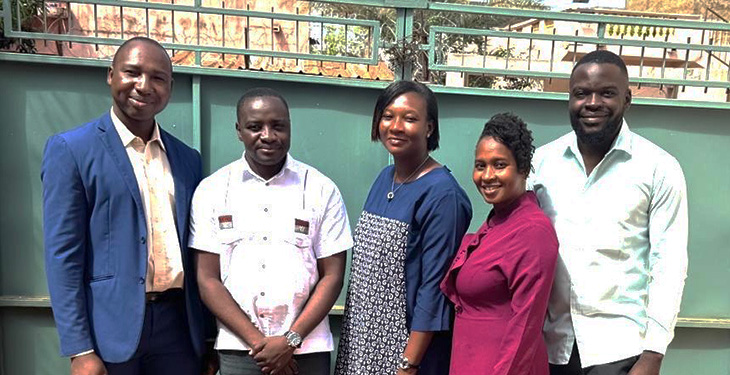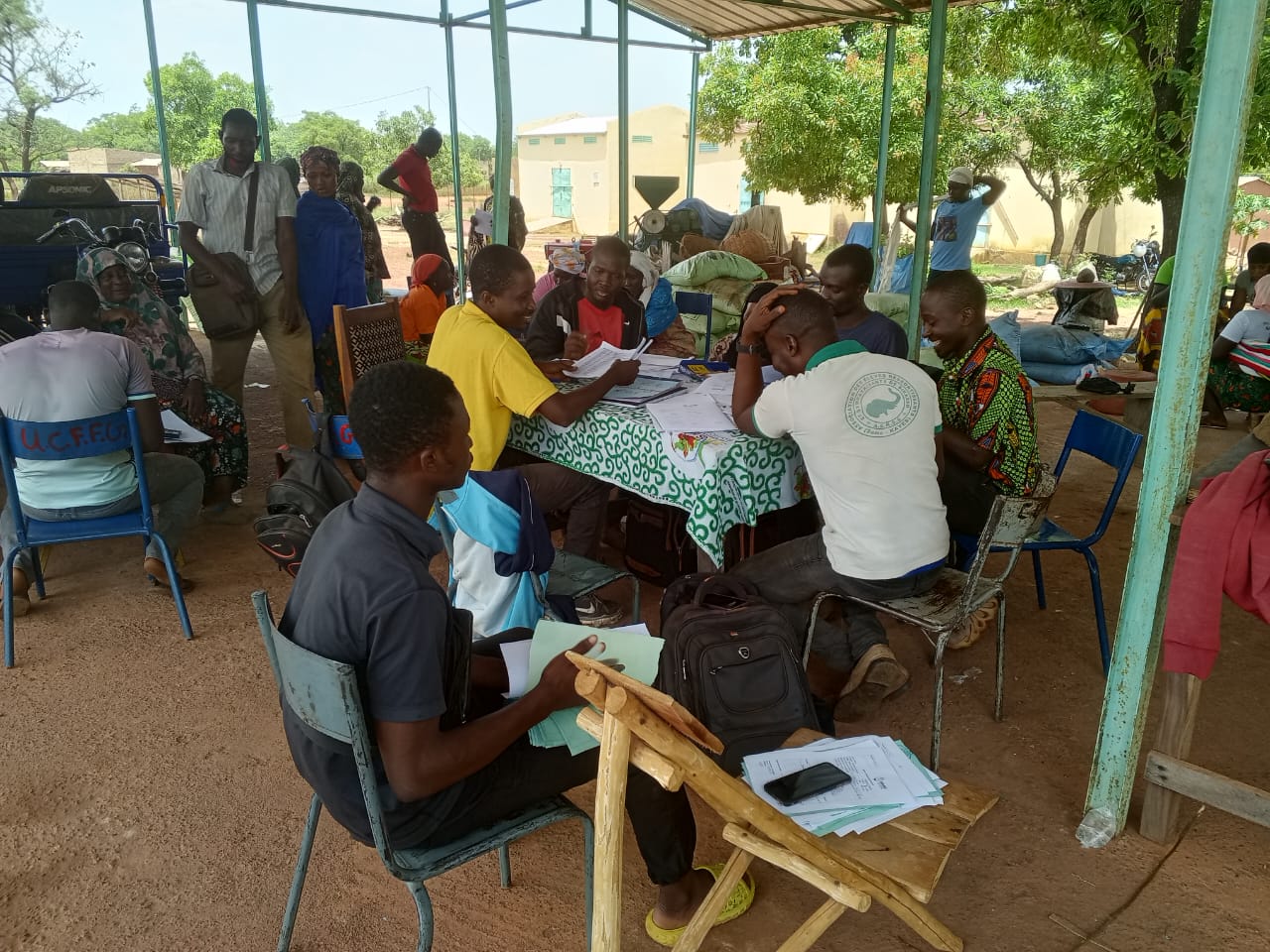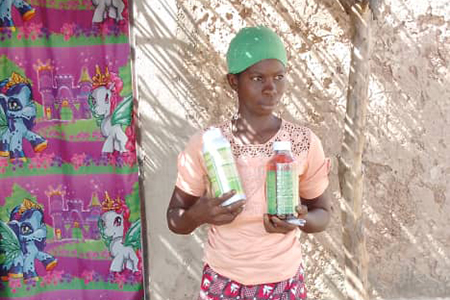Mali Office: A Legacy of Innovation and Impact

IPA staff photographed at the Mali country office. From left to right: Etienne Traoré (Operations and Administrative Assistant), Thierry Ogoutchoro (Research Associate), Tilomian Koné (Operations and Finance Manager for Francophone West Africa), Kadidia Maïga (Finance and Administrative Assistant), and Ali Doumbia (Field Manager)
When IPA thought of opening its first office in Francophone West Africa, Mali was the perfect choice. It was 2009, and while the Sahel region faced significant poverty challenges, it was relatively stable and ripe for the kind of rigorous research that could make a real difference in people's lives.
The Mali office started small. Nouhoum Traore was the first staff member, soon joined by Aissatou Ouedraogo, Hamadoun Bocoum, and Loïc Watine, who became the first Country Director and is now IPA's Chief Research and Policy Officer. Also, leading academics like Dean Karlan, Lori Beaman, and Andrew Dillon—some of whom had previously lived in rural Mali—brought deep expertise.
Those early days, enumerators didn't just visit villages for data collection; they set up camp and lived alongside the communities they were working with. As IPA's first office in the region, the Mali team quickly became mentors to new offices across Francophone West Africa, with managers making exhausting 12-hour bus rides to Burkina Faso to train new enumerators.
"They understood the standards of IPA's research and provided oversight for research activities across the region," Watine recalls.
IPA is now faced with the difficult decision to close its Mali office due to a challenging operating environment. While we transition out of the country, we carry forward the innovations and lessons that began here.
Innovations in Data Collection
While most research operations still relied on paper questionnaires, Mali's team had bigger ambitions. They became the first IPA office globally to fully transition to digital data collection, equipping their researchers with netbook laptops running Blaise software. Picture this: teams working in remote Sahelian villages, powered by generators to recharge their equipment, revolutionizing how development data was gathered in real time.
Nicoló Tomaselli, who served as Country Director from 2012 to 2017, remembers the technical ingenuity required. The office IT specialist went so far as to code custom solutions for running surveys on those netbooks while maintaining paper backups—just in case. "This wasn't just technological advancement," Tomaselli explains. "It was innovation driven by the determination to produce better research under the most challenging conditions."
That determination would be tested when security concerns forced operations to suspend in 2012 for one year. Throughout these challenges, what distinguished IPA Mali was the people. The relationships forged weren't just professional—they were deeply personal bonds that sustained the team through difficult periods.
The research they produced in collaboration with other partners during these years had a lasting impact across multiple sectors. For example, their work on agriculture transformed how we think about farmer support—from demonstrating that village input fairs could make seeds and fertilizers more accessible in isolated areas. This project is now scaling to Ghana. They also showed that agricultural loans work well when they match farmers' actual cash flow patterns rather than rigid banking schedules and can leverage community networks effectively to identify farmers who could make the best use of funds.

Farmers filling in purchase order fulfillment forms to testify that inputs were delivered in Sikasso, Mali as part of the Village Input Fairs (VIFs), organized by ACAD, one of the project's implementing partners. © 2025 ACAD

A farmer shows the inputs she received as part of the Village Input Fairs (VIFs). © 2025 MASSARAN (another one of the project's implementing partners)
In education, their evaluation of Speed Schools showed that accelerated learning programs could successfully reintegrate out-of-school children back into the formal system, crucial evidence for a region where conflict and poverty often disrupt schooling.
In healthcare, one of their evaluations demonstrated that removing cost barriers for caregivers dramatically increases timely medical care—evidence that influenced health financing approaches across West Africa. Finally, their work on women's savings groups provided concrete proof that these programs boost food security and asset ownership, informing regional strategies for women's economic empowerment.
Read more about other studies that were conducted in Mali here.
Closing a Chapter
After years of groundbreaking research and policy work, the office is closing, but its legacy continues to influence research and policy far beyond Mali’s borders. At its peak, the IPA Mali team included 20 permanent local staff who tackled research challenges across agriculture, education, health, governance, and peace-building and established collaborative relationships between IPA and partners that produced years of impactful research.
Perhaps the most lasting contribution is the human capital the office developed. IPA Mali became a launching pad for careers across the development sector. The office trained dozens of research associates and managers from Mali and beyond, many of whom have gone on to remarkable achievements.
But it wasn't just the permanent staff. Hundreds—perhaps thousands—of enumerators learned cutting-edge research and data collection methods through IPA Mali's projects. That training created a ripple effect, as these skilled researchers went on to work with other organizations across the country and region, spreading methodological rigor wherever they landed.
The innovations born from Mali's challenging environment didn't stay local either. The digital data collection methods pioneered in Mali have become standard across the organization and many of the lessons learned there continue shaping how the organization approaches difficult environments worldwide.
Above all, we are deeply grateful to the dedicated staff who built and sustained the Mali office over the years. Their professionalism and perseverance under challenging circumstances made every achievement possible. We also appreciate the collaboration of our donors, partners, and researchers and will continue our collaborations with local organizations. The office’s legacy is carried not only in the research and innovations it produced, but also in the many individuals who contributed their time, talent, and passion—a legacy that will continue shaping IPA and the broader development community.












